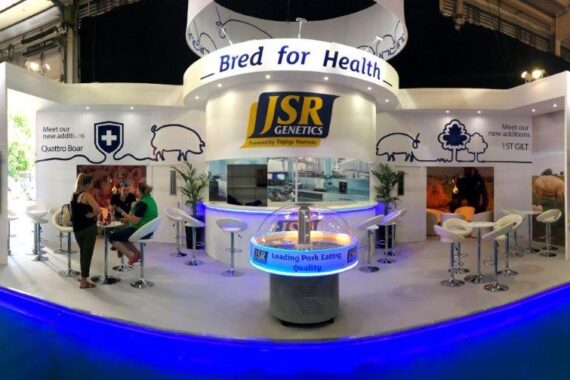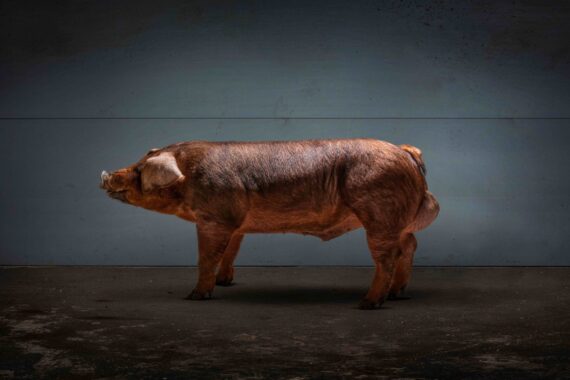JSR’s Alex Haigh speaks at Pigs Tomorrow on reducing our carbon footprint

JSR speaks at Pigs Tomorrow on our journey towards Net Zero
At the recent Pigs Tomorrow conference in May 2023, Alex Haigh, our Technical Co-ordinator at JSR Genetics, delivered a presentation on how JSR is reducing our carbon footprint and advancements towards achieving net zero. The conference, attended by over 250 members of the pig industry, spanned two days and featured discussions on various topics, including a global overview of the pig industry, reforming the pork supply chain, and addressing workforce retention challenges.
Alex’s presentation, categorised under the theme of ‘enhancing our brand,’ focused on sharing our efforts towards carbon footprint reduction.

Alex identified seven key areas of JSR’s journey to net zero so far…
1. Picking a Carbon Calculator which is right for your business
This was not an easy task! With the wide variety of carbon calculators available, JSR trialled several before selecting the one best suited for our integrated farming business.
Alex’s advice when choosing your carbon calculator was:
“Trial and select the one which best fits your business and stick with it. Benchmarking is much easier if you continue with the same calculator, so invest time in choosing the right one for your business. Yearly analysis will identify any areas with a natural reduction or increase in carbon emissions and therefore help to build your action plan, starting with the quick wins and moving onto longer term goals.”
2. Benchmarking each year
Initially this was a difficult exercise but over time this has become easier and it has paid off with annual benchmarking making data collection easier with each year that passes.
3. Analysing and presenting the results
Analysis of the results and presenting back within the business has allowed us or see any natural reduction or increase in emissions. It is not until you see the results down in front of you that you can identify a trend or pattern in the data and how that looks in real life.
4. Identifying areas for improvement
Once the year-on-year results were in, we were then able to see which areas could be improved upon quickly and effectively.
5. Developing an action plan
With an extensive list of what could be improved upon it was then time to make that into an action plan. Starting with the easy wins and moving onto the items which would require a longer-term investment.
6. Adopting more sustainable farming practices
Doing this work has highlighted to us that JSR do and have been farming regeneratively for quite some time. The integrated farming approach which was adopted when John Sykes Rymer founded JSR Farms in 1958 still runs to this day. This does put us at an advantage, however, the emphasis on our carbon footprint has further motivated us to adopt increasingly sustainable farming methods.
7. Trials and future
As with most businesses in the pig industry, our main barrier to Net Zero is feed emissions. Soya currently contributes to approximately one third of our pig business emissions, feed being overall two thirds. We are constantly looking into alternative protein sources, our aim being to grow the protein ourselves to complete our sustainability circle.
To find out more about some of the strategies JSR have used within our pig and arable businesses, read our latest news for find out more:
JSR Genetics: Reducing our Carbon Footprint and progressing towards Net Zero
JSR Farms: Reducing our Carbon Footprint and progressing towards Net Zero
For more information or if you are interested in careers at JSR Genetics then please get in touch.
CONTACT US










